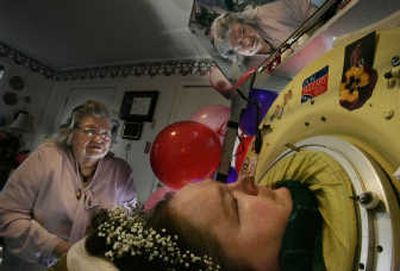Woman who spent life in iron lung dies at 61

MEMPHIS, Tenn. – For almost 60 years, Dianne Odell lived inside a 7-foot-long metal tube, unable to breathe outside of it but determined not to let it destroy her spirit for life.
From her 750-pound iron lung, she managed to get a high school diploma, take college courses and write a children’s book about a “wishing star” named Blinky.
“I’ve had a very good life, filled with love and family and faith,” she told the Associated Press in a 1994 interview. “You can make life good or you can make it bad.”
Odell, 61, died Wednesday when a power failure shut off electricity and stopped the pump drawing air into her lungs.
Family members were unable to get an emergency generator working after a power failure knocked out electricity to the Odell family’s residence near Jackson, Tenn., about 80 miles northeast of Memphis, brother-in-law Will Beyer said.
“We did everything we could do but we couldn’t keep her breathing,” Beyer said. “Dianne had gotten a lot weaker over the past several months and she just didn’t have the strength to keep going.”
Odell, who contracted polio when she was 3 years old, lived with her parents, Freeman and Geneva Odell, and their house was equipped with an emergency generator designed to fire up immediately in a power failure.
“But for some reason, it didn’t come on,” Beyer said.
Family members even tried an emergency hand pump attached to the iron lung. “Everyone knew what we were supposed to be doing,” Beyer said. “It just wasn’t working.”
Capt. Jerry Elston of the Madison County Sheriff’s Department said emergency crews could do little to help. The local power company reported spotty power outages in the area because of storms.
Odell was afflicted with “bulbo-spinal” polio three years before a polio vaccine was discovered and largely stopped the spread of the crippling childhood disease.
Her care was provided by her parents, other family members and aides provided by a nonprofit foundation.
“Dianne was one of the kindest and most considerate people you could meet. She was always concerned about others and their well-being,” said Frank McMeen, president of the West Tennessee Health Care Foundation, which helped raise money for equipment and nursing assistance for Odell.
Odell’s iron lung, similar to those used during the U.S. polio epidemics that peaked in the 1950s, was a cylindrical chamber with a seal at the neck. She lay on her back with only her head exposed and made eye contact with visitors through an angled mirror. She operated a television set with a small blow tube and wrote on a voice-activated computer.
The positive and negative pressures produced by the machine forced air into her lungs and then expelled it.
In the late 1950s, iron lungs were largely replaced by positive-pressure airway ventilators that give users much more freedom of movement. But a spinal deformity from the polio kept Odell from wearing a more modern, portable breathing device.
Though Odell could not leave the iron lung, she was able to be moved in the machine. For Odell’s 60th birthday, in February 2007, friends and family held a party for her, with about 200 guests, at a downtown hotel in Jackson, a town of about 50,000 residents.
She had a 9-foot birthday cake and got letters from people all over the country, McMeen said.